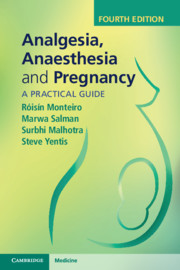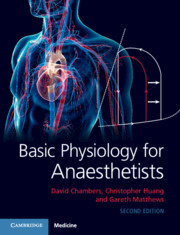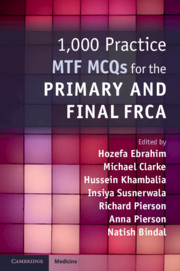
This page contains resources likely to aid in assessment preparation for RGA trainees.
 Further detail on assessments may be found in the Rural Generalist Anaesthesia Training Program Curriculum and Rural Generalist Anaesthesia Handbook for Training.
Further detail on assessments may be found in the Rural Generalist Anaesthesia Training Program Curriculum and Rural Generalist Anaesthesia Handbook for Training.
How to access e-books
 Use your ANZCA college ID (or staff username) and password to access library e-resources.
Use your ANZCA college ID (or staff username) and password to access library e-resources.
 Having trouble logging into e-resources? Try emptying your browser cache, closing and reopening your browser and trying again.
Having trouble logging into e-resources? Try emptying your browser cache, closing and reopening your browser and trying again.
 Forgotten your ANZCA password? Try resetting your password using the "Forgot Password?" link and/or messaging the "Webmaster (technical issues)" via the college contact form
Forgotten your ANZCA password? Try resetting your password using the "Forgot Password?" link and/or messaging the "Webmaster (technical issues)" via the college contact form
 Can't find your book online? Borrow a print copy or request a chapter via our article request service
Can't find your book online? Borrow a print copy or request a chapter via our article request service
 Experiencing difficulties, or need help accessing e-books? Contact the Library
Experiencing difficulties, or need help accessing e-books? Contact the Library
 For further information about searching and accessing e-books, see the E-books guide
For further information about searching and accessing e-books, see the E-books guide
Borrowing books
 ANZCA library provides access to a large range of print items, specialising in anaesthesia and pain medicine-related titles.
ANZCA library provides access to a large range of print items, specialising in anaesthesia and pain medicine-related titles.
 For further information about requesting books, see the Borrowing books page
For further information about requesting books, see the Borrowing books page
A note on exam texts
 Several acronyms are used repeatedly by the texts listed in this guide. What follows is a summary of the key acronyms.
Several acronyms are used repeatedly by the texts listed in this guide. What follows is a summary of the key acronyms.
Recommended reading list
 Recommended resources are listed below. The full ANZCA primary exam: recommended reading list of resources can be accessed via the ANZCA PEx guide.
Recommended resources are listed below. The full ANZCA primary exam: recommended reading list of resources can be accessed via the ANZCA PEx guide.
Key texts
 The First Year: What You Should Know After a Year of Anaesthesia Training (Revised Edition) by
Recommended
This book is not an exam primer nor is it a comprehensive textbook of anaesthesia. This is the book you give to the trainee specialist who is about to embark on their anaesthesia training. It contains the information they need to formulate and develop a safe practice of anaesthesia. This book lucidly describes and justifies the core knowledge, behaviours and practical skills that a junior trainee would be expected to possess after a year of anaesthesia. Written specifically for Australasian specialist anaesthetic trainees and those doing the Rural Generalist Anaesthesia (RGA) training course, this book fills the gaping hole in the existing anaesthetic literature. The curriculum for the Introductory Training period and the RGA is comprehensively addressed in this book.
The First Year: What You Should Know After a Year of Anaesthesia Training (Revised Edition) by
Recommended
This book is not an exam primer nor is it a comprehensive textbook of anaesthesia. This is the book you give to the trainee specialist who is about to embark on their anaesthesia training. It contains the information they need to formulate and develop a safe practice of anaesthesia. This book lucidly describes and justifies the core knowledge, behaviours and practical skills that a junior trainee would be expected to possess after a year of anaesthesia. Written specifically for Australasian specialist anaesthetic trainees and those doing the Rural Generalist Anaesthesia (RGA) training course, this book fills the gaping hole in the existing anaesthetic literature. The curriculum for the Introductory Training period and the RGA is comprehensively addressed in this book.
 Miller's Anesthesia, 10e by
***Highly Recommended*** Offering up-to-date coverage of everything from historical and international perspectives to basic science and today’s clinical practice, Miller's Anesthesia 10e, remains the #1 reference and trusted learning resource for practitioners and trainees in this complex field. Dr. Michael Gropper leads a team of expert editors and contributing authors who provide current information on the technical, scientific, and clinical issues you face each day—whether you’re managing a challenging patient care situation, preparing for the boards, or studying for recertification.
Miller's Anesthesia, 10e by
***Highly Recommended*** Offering up-to-date coverage of everything from historical and international perspectives to basic science and today’s clinical practice, Miller's Anesthesia 10e, remains the #1 reference and trusted learning resource for practitioners and trainees in this complex field. Dr. Michael Gropper leads a team of expert editors and contributing authors who provide current information on the technical, scientific, and clinical issues you face each day—whether you’re managing a challenging patient care situation, preparing for the boards, or studying for recertification.
Recommended texts
 Analgesia, Anaesthesia and Pregnancy: A Practical Guide, 4e by
Now in its fourth edition, Analgesia, Anaesthesia and Pregnancy is a concise guide to obstetric anaesthesia and analgesia. This essential text reviews every topic and clinical challenge faced during delivery and focuses on pre-empting problems and maximising quality of care. It also covers acute emergencies related to pregnancy. This new edition features eleven new chapters that cover the significant updates in the field over the last few years. Presented in a clearly structured format, this practical guide will be an invaluable source of key information for any anaesthetist encountering obstetric patients, whether they are a practised consultant or still in training.
Analgesia, Anaesthesia and Pregnancy: A Practical Guide, 4e by
Now in its fourth edition, Analgesia, Anaesthesia and Pregnancy is a concise guide to obstetric anaesthesia and analgesia. This essential text reviews every topic and clinical challenge faced during delivery and focuses on pre-empting problems and maximising quality of care. It also covers acute emergencies related to pregnancy. This new edition features eleven new chapters that cover the significant updates in the field over the last few years. Presented in a clearly structured format, this practical guide will be an invaluable source of key information for any anaesthetist encountering obstetric patients, whether they are a practised consultant or still in training.
 Australasian Anaesthesia 2023 by
Australasian Anaesthesia 2023 by  Stoelting's Pharmacology and Physiology in Anesthetic Practice, 6e by
Stoelting's Pharmacology and Physiology in Anesthetic Practice, 6e by Anatomy
 Anatomy for the FRCA by
Anatomy questions are asked in all parts of the FRCA examinations, and for many trainees it is a particularly daunting part of the exams. This important new book provides a comprehensive, exam-orientated clinical anatomy book for anaesthetists preparing for all parts of the FRCA. It covers all body regions, relating underlying anatomy to practical procedures and anatomical principles, spanning the breadth of the curriculum and comprising exam-style questions: a chapter of SAQ questions, one of OSCE stations, one of SOE questions and one of MCQs. The text is highly illustrated in full colour with ultrasound images, diagrams and photographs of cadaveric material and models.
Anatomy for the FRCA by
Anatomy questions are asked in all parts of the FRCA examinations, and for many trainees it is a particularly daunting part of the exams. This important new book provides a comprehensive, exam-orientated clinical anatomy book for anaesthetists preparing for all parts of the FRCA. It covers all body regions, relating underlying anatomy to practical procedures and anatomical principles, spanning the breadth of the curriculum and comprising exam-style questions: a chapter of SAQ questions, one of OSCE stations, one of SOE questions and one of MCQs. The text is highly illustrated in full colour with ultrasound images, diagrams and photographs of cadaveric material and models.
Clinical Measurement, Equipment and Safety
Physiology - General
 Basic Physiology for Anaesthetists, 2e by
Every trainee in anaesthesia requires a thorough understanding of basic physiology and its application to clinical practice. Now in its second edition, this comprehensively illustrated textbook bridges the gap between medical school and reference scientific texts. It covers the physiology requirements of the Primary FRCA examination syllabus.
Basic Physiology for Anaesthetists, 2e by
Every trainee in anaesthesia requires a thorough understanding of basic physiology and its application to clinical practice. Now in its second edition, this comprehensively illustrated textbook bridges the gap between medical school and reference scientific texts. It covers the physiology requirements of the Primary FRCA examination syllabus.
Physiology - Respiratory
Physiology - Cardiovascular
Pharmacology
 Stoelting's Pharmacology and Physiology in Anesthetic Practice, 6e by
Stoelting's Pharmacology and Physiology in Anesthetic Practice, 6e by Practical Clinical Anaesthesia
 The First Year: What You Should Know After a Year of Anaesthesia Training (Revised Edition) by
Recommended
This book is not an exam primer nor is it a comprehensive textbook of anaesthesia. This is the book you give to the trainee specialist who is about to embark on their anaesthesia training. It contains the information they need to formulate and develop a safe practice of anaesthesia. This book lucidly describes and justifies the core knowledge, behaviours and practical skills that a junior trainee would be expected to possess after a year of anaesthesia. Written specifically for Australasian specialist anaesthetic trainees and those doing the Rural Generalist Anaesthesia (RGA) training course, this book fills the gaping hole in the existing anaesthetic literature. The curriculum for the Introductory Training period and the RGA is comprehensively addressed in this book.
The First Year: What You Should Know After a Year of Anaesthesia Training (Revised Edition) by
Recommended
This book is not an exam primer nor is it a comprehensive textbook of anaesthesia. This is the book you give to the trainee specialist who is about to embark on their anaesthesia training. It contains the information they need to formulate and develop a safe practice of anaesthesia. This book lucidly describes and justifies the core knowledge, behaviours and practical skills that a junior trainee would be expected to possess after a year of anaesthesia. Written specifically for Australasian specialist anaesthetic trainees and those doing the Rural Generalist Anaesthesia (RGA) training course, this book fills the gaping hole in the existing anaesthetic literature. The curriculum for the Introductory Training period and the RGA is comprehensively addressed in this book.
Exam preparation texts
 Recommended resources are listed below. The full list of Exam Preparation resources can be accessed via the Exam preparation guide.
Recommended resources are listed below. The full list of Exam Preparation resources can be accessed via the Exam preparation guide.
General
 The ANZCA Primary Exam Companion by
This book addresses all components of the anaesthetics primary exam with a focus on the vivas. Exam resources, exam technique, diagrams, opening viva questions, practice SAQs, a study template and 500 short format questions and answers that traverse the entire curriculum are contained within this book.
The ANZCA Primary Exam Companion by
This book addresses all components of the anaesthetics primary exam with a focus on the vivas. Exam resources, exam technique, diagrams, opening viva questions, practice SAQs, a study template and 500 short format questions and answers that traverse the entire curriculum are contained within this book.
MCQ resources
 1,000 Practice MTF MCQs for the Primary and Final FRCA by
Written for anaesthesia trainees, this comprehensive text covers all the MCQ preparation required for both the Primary and Final FRCA exams. Broken down into five sections, there are 150 questions for each of the physics, pharmacology, anatomy, and physiology sections, and a fifth section of 400 questions covering clinical anaesthesia. The first four sections of 150 questions match the Primary exam and are laid out to follow its format. The fifth clinical section covers the entire clinical syllabus. The authors are educators in anaesthesia and surgery and their wealth of experience has been brought together in this text to benefit the next generation of anaesthetists. Covering the entire syllabus, with 1,000 expertly distributed questions, this is the most comprehensive text available for MCQ preparation for both parts of the FRCA.
1,000 Practice MTF MCQs for the Primary and Final FRCA by
Written for anaesthesia trainees, this comprehensive text covers all the MCQ preparation required for both the Primary and Final FRCA exams. Broken down into five sections, there are 150 questions for each of the physics, pharmacology, anatomy, and physiology sections, and a fifth section of 400 questions covering clinical anaesthesia. The first four sections of 150 questions match the Primary exam and are laid out to follow its format. The fifth clinical section covers the entire clinical syllabus. The authors are educators in anaesthesia and surgery and their wealth of experience has been brought together in this text to benefit the next generation of anaesthetists. Covering the entire syllabus, with 1,000 expertly distributed questions, this is the most comprehensive text available for MCQ preparation for both parts of the FRCA.
VIVA resources

*Please Note: The user must create a free local profile to access this feature.
The college acknowledges the Traditional Custodians of Country throughout Australia and recognises their unique cultural and spiritual relationships to the land, waters and seas and their rich contribution to society. We pay our respects to ancestors and Elders, past, present and emerging.
The college acknowledges and respects Māori as the Tangata Whenua of Aotearoa and is committed to upholding the principles of the Te Tiriti o Waitangi, fostering the college’s relationship with Māori, supporting Māori fellows and trainees, and striving to improve the health of Māori.
The college recognises the special relationship between the Pacific peoples of New Zealand, Australia and the Pacific, and is committed to supporting those fellows and trainees of ANZCA, and improving the health of Pacific peoples.